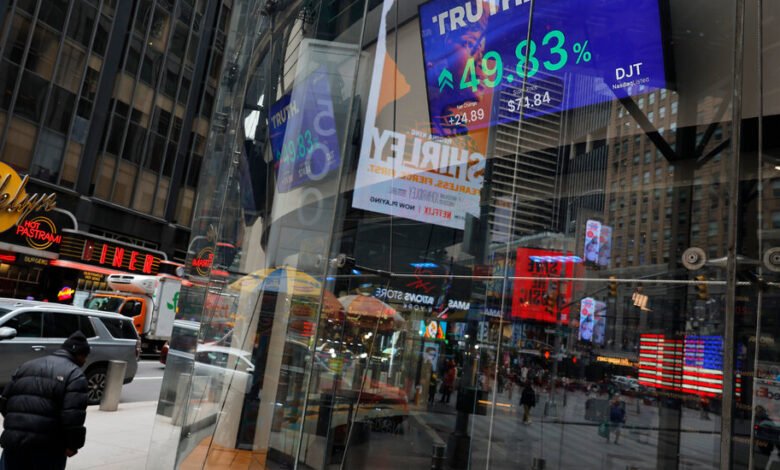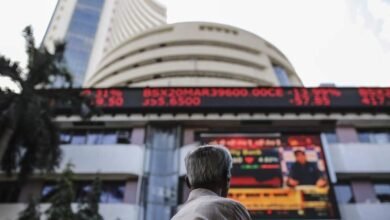Traders Are Betting Millions That Trump Media Will Tumble

Before former President Donald J. Trump’s social media company made its stock market debut, many investors were lining up to bet on its collapse. After the company’s share price plunged following an initial surge, the appetite to bet against the stock has grown even more ravenous.
Trump Media & Technology Group, which trades under the ticker DJT, slipped on Wednesday to below $50 per share, extending a steep decline this week that pulled the stock down from its high near $80 and erased more than $2 billion of market value.
Trump Media is the most “shorted” special purpose acquisition vehicle in the country, according to the financial data company S3 Partners. Short-sellers bet that the price of a stock will fall. They do that by borrowing shares of a company and selling them into the market, hoping to buy them back later at a lower price, before returning the shares to the lender and pocketing the difference as profit.
The demand to short Trump Media, the parent company of the social media platform Truth Social, is so great that stock lenders can charge enormous fees, making it hard for short-sellers to turn a profit unless the shares fall significantly. Still, there is a lot of interest in taking the bet.
“They are looking for this stock to crater and crater very quickly,” said Ihor Dusaniwsky, managing director of predictive analytics at S3.
Before Trump Media got its stock market listing, it agreed to merge with a shell company, Digital World Acquisition Corporation, which went public in 2021. In the months before the merger, which closed last week, investors also bet heavily against Digital World as a proxy for Trump Media.
It was largely a losing trade: This year, the shell company’s shares more than doubled as Mr. Trump became the overwhelming favorite as the Republican presidential nominee and regulators approved the merger.
Last month, traders lost $126 million betting against Trump Media, according to S3.
On Monday, Trump Media published updated financial information, revealing little revenue, large losses and a statement from the company’s independent auditor expressing “substantial doubt” about its financial viability. This appeared to galvanize investors betting against the company, as the stock slipped from its highs.
But short-sellers are finding it difficult and costly to trade in Trump Media. There are roughly 137 million shares in the company, and only around five million of those are available to short-sellers.
Mr. Trump owns about 60 percent of shares, and company executives also hold a chunk of the stock. Company insiders tend not to lend their shares to short-sellers. Big asset managers like BlackRock, Vanguard and State Street, which regularly lend out shares, are not major holders of Trump Media, further crimping the supply.
According to S3, 4.9 million of the roughly five million available shares are already on loan. As with any loan, when share owners lend their stock to a short-seller, they charge a fee, usually expressed as an annual interest rate on the stock’s current value. Typically, the fee for borrowing stock is a fraction of a percentage point. For Trump Media, it has risen to 550 percent, Mr. Dusaniwsky said.
Trump Media’s stock currently trades at around $50. That means that shorting it for a month would cost more than $20 per share. For a short-seller to break even, the stock price would have to fall by almost half by early May.
There is another wrinkle, too. One large broker said much of the short trading was not an outright bet against Trump Media. Since the advent of meme-stock trading and the vilification of short-sellers that win only if popular companies lose, large investors are wary of making such trades.
Instead, the current trade driving demand is designed to capture the difference between DJT’s stock price and outstanding “warrants,” which will give the owners the right to new stock at a fixed price as long as regulators approve the new shares.
Partly because of that uncertainty, those warrants currently trade below $19, with a list of hedge funds as recent holders. Even after the high cost to borrow stock is accounted for, they are still able to profit from the $30 difference between existing stock and what the warrants are worth, assuming the warrants become registered as shares.
“There are still so many people looking to short the name,” Mr. Dusaniwsky said.
Bold bets can also be seen in the market for stock options, which are derivatives tied to the share price of a stock. Options are essentially a contract between two parties agreeing to a price for buying or selling a stock ahead of a specified date. Most of the interest has been for contracts with prices well above or well below the current stock level, according to data from CBOE Global Markets, meaning investors are betting on big movements in either direction — way up or way down.
The cost of these options is also very high, said Henry Schwartz, global head of client engagement, data and access solutions at CBOE. That, he said, might be because some of the investor base is politically and not economically motivated.
“The price it is trading at doesn’t make any sense, but price and value don’t have to be related in the short term,” Mr. Schwartz said.
Source link





